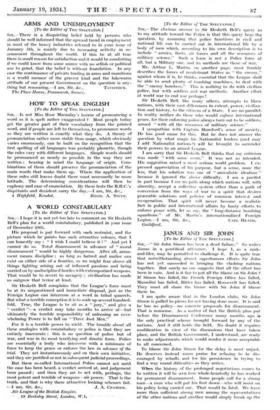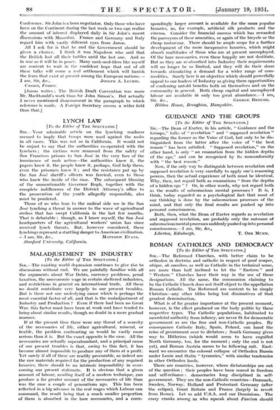JANUS AND SIR JOHN [To the Editor of THE SPECTATOR.]
SIR,—" Sir John Simon has been a dead failure." So writes Janus in a pontifical utterance. I hope I, as a rank- and-filer, may be permitted to challenge it. It is quite true that notwithstanding almost superhuman efforts Sir John has not yet succeeded in bringing the clashing nations together. But surely no one suggests that all the effort has been in vain. And is it fair to put all the blame on Sir John ? If Simon has failed, the French Foreign Office has failed, Mussolini has failed, Hitler has failed, Roosevelt has failed. They must all share the blame with Sir John if blame there be.
I am quite aware that in the London clubs, Sir John Simon is pulled to pieces for not having done more. It is said he has no policy—no concrete proposals for disarmament. That is nonsense. As a matter of fact the British plan put before the Disarmament Conference many months ago is the only practical scheme brought forward by any of the nations. And it still holds the field. No doubt it requires modification in view of the discussions that have taken place, and the British Government, I understand, are ready to make adjustments which would render it more acceptable to all concerned.
To blame Sir John Simon for the delay is most unjust. He deserves instead warm praise for refusing to be dis- couraged by rebuffs and for his persistence in trying to find a way round difficulties as they arrive.
When the history of the prolonged negotiations comes to be written it will be seen how whole-heartedly he has worked for permanent disarmament. Some people call for a strong man—a man who will put his foot down—who will insist on his policy being carried out. That would be fatal. We have more than sufficient strong men among the representatives of the other nations and another would simply break up the Conference. Sir John is a born negotiator.' -only those who have been on the Continent during the last week or-two can realize the amount of interest displayed daily in Sir John's recent Mscussions with Mussolini. France and Germany and Italy regard him with vastly different eyes from Janus.
All I ask for is that he and the Government should be given a chance. I think it was Napoleon who said that the British lost all their battles until. the last one. And as in war so it will be in peace. Many rank-and-filers like myself are content to wait in the confident hope that out of all these talks will come a real settlement which will banish the fears that exist at present among the European nations.— [Janus writes : The British Draft Convention was more Mr. MacDonald's work than Sir John Simon's. But actually I- never mentioned disarmament in -the paragraph to which reference is made. A Foreign Secretary covers a wider field than that.]









































 Previous page
Previous page